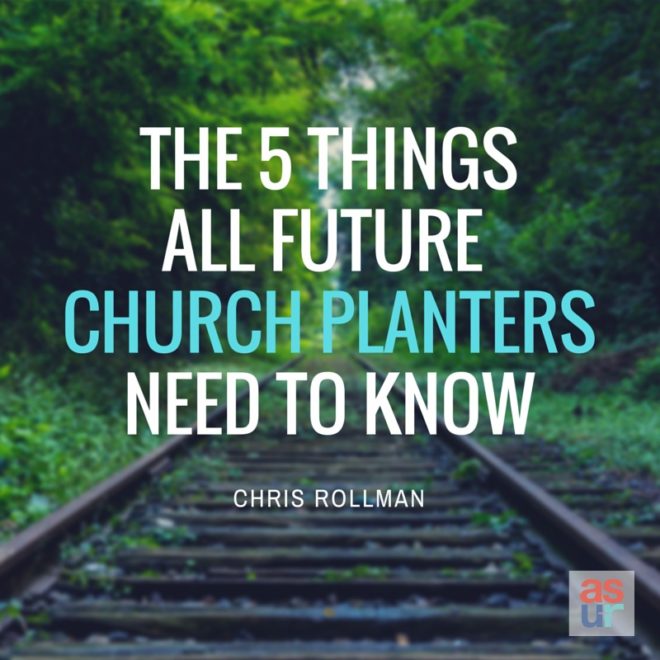
I long to convince people to plant a church, be part of a church plant, or support church planting, but the reality is not all people should be church planters. Over years of working closely with church planters and vocational pastors, I have come to realize five important things future church planters should know. My experience is based on observation, sad stories, success stories, and God-glorifying moments within disciple-making and evangelism. Whether you are a youth or college pastor considering planting, or whether you are currently in the early stages of planting a church, hopefully the following will inform, inspire and warn of issues planters face.
- Church planting is not a job.
I remember a conversation with a church planter in which I asked him why he knew he needed to plant a church. He answered me with confidence, “Because I need a job!” At that point I confidently told him he should find a different vocation until he heard from God, from others, and from Scripture that he needed to plant a church. Until his heart broke for a people in a geography or culture, this would not be a venture he should pursue. It’s not a job.
- Church Planting is a calling.
Calling is always confirmed by those around you, by Scripture and by experience. People have different calling journeys, but often calling is what sustains a planter through a desolate, difficult period of time in the planting process. When called, they can hang their hat on the fact that God called them to this and He will see them through.
Tweet now: God is sufficient for all things; He is powerful, all-knowing, and cares deeply for His kids. 
Even when a church plant fails, God’s call is remembered because this is what sustains the inner life of a church planter.
- Family members are your first core team members.
I know a planter who planted a church a few years ago but recently discovered his family was “done” with the church they had started. They were done because the planter was giving everything he had, all the time, to everyone other than his family.
Disciple your family, lead your wife, and love them. Inspire them to live in a way that cultivates relationships with those who don’t know Christ. Invite them to sacrificially give to the body of Christ that you, together, are working to establish. Don’t neglect them. Jesus asked pastors/shepherds to feed the sheep, but sometimes church planters neglect feeding the sheep closest to them.
What do you gain if you lead the largest, most “successful” church plant in the world, but don’t have those you love and cherish by your side, under your care and leadership? You gain nothing and the kingdom of God loses.
- Your church plant will mirror your emotional and spiritual health.
Planting a church is impossible if you aren’t connected with the head of the church, Jesus Christ. You can plant an organization with you as the CEO and the king of the kingdom; however, it is impossible to plant a church that is kingdom-minded if you are disconnected from Jesus or emotionally unhealthy. If you aren’t connected with the King of Kings and Lord of Lords, you will find yourself deficient in all things, unable to capitalize on significant moments that require the power of the Holy Spirit to be clearly present.
I have a good friend who says, “We need to be desperately dependent on God for all things and when we are not, we are simply displaying our arrogance.” I have observed many church planters who think they are sufficient to plant their church. It’s only when a church planter is full of anxiety and fear that the Holy Spirit works in amazing ways to display the glory and power of God.
If you are planting a church out of some unhealthy animosity toward the established church or you are trying to prove something to yourself or others, please don’t. Get healthy. Be excited about the Kingdom of God expanding in ways you didn’t think possible. Seek God’s face and an understanding of your own personal emotional and spiritual health.
- It’s not sexy or the latest fad.
One of the trends I have observed is that successful youth pastors are planting churches at a fairly alarming rate. I think youth pastors can be wonderful church planters as long as youth pastors recognize some of their success (maybe the majority of it) is because of the success of the system they serve instead of their own giftedness and leadership. Because youth pastors have led an organization inside an organization, they often have the skill set to plant a church and a false confidence that allows them to move forward quickly. If I could pull aside a youth pastor turning planter, I would say this is not the next step up the ladder or the next fad. This is a calling of God in their lives and they generally will plant what they have known.
Church Planting
It’s the hardest thing you’ll ever do. I could tell you story after story of friends who had significant, crazy things happen in their lives as they began to plant their church. I could tell you of a church planter who had serious thoughts of taking his own life because of the pressure he felt in the process. Another planter wanted to just leave it all, including his family, because of what he experienced in planting. It’s not easy. The success stories we hear fail to point out these difficult moments. Because stories of the challenges involved are not so well-known, church planters often expect that it will “just work.”
In the New Testament we find Paul planting churches. Over half of the books Paul wrote in our canon of Scripture, were written from prison. Planting those churches came with complexities, difficulties, and hardships. In many cases, planting a church ended with Paul in prison, abused for his work in guiding people toward the gospel.
A church planter with whom I work experienced a difficult situation early on of his church splitting into a much-fractured group of people. These were people who had given themselves to one another, sacrificed what they had to make this planting work, and yet they disagreed on an issue. The church was unable to move forward and ended up disbanding. This set the local church back significantly. It’s been three years since they launched the first time. The church planter recognizes much of the issue they experienced as a church lies in his emotional and spiritual health in that period of time. He has to be patient. He must lean into the power and grace of God. He realized early on this was not a sexy venture or a fad in which to partake, but a difficult and complex calling.
Planting is not up and to the right
There are right motivations to plant a church. If you love people and want to see the gospel transform them, you might be a good church planter. But when it’s about people, it’s messy and has regular ups and downs. Attendance dwindles and grows in succession and from week to week. People will leave that you never thought would leave your core team. People will show up that you wish would go somewhere else. There are people who will be part of your church for YEARS before you see God do a work in them and they come to faith. There will be people who hide marriage problems until they divorce and you didn’t have a clue. These are difficult situations to work through and often we have an expectation planting is always up and to the right.
But usually it looks more like this.
Managing your expectation matters
I’ll regularly ask planters during a church plant assessment, “How many people do you think will come to your first launch service?” Generally their response is very faith-filled and they answer with a clear number, usually very high. We shouldn’t be opposed to praying for numerical increase or having faith God will bring people to our context or to faith. Managing expectations recognizes the realities that exist in a specific geography or demography. If you are planting in a small town, you aren’t going to have thousands of people show up on launch day. And if you carry that expectation, you will be profoundly and deeply disappointed, even when the spirit of God does amazing work in and through your church plant.
Hundreds of other thoughts in four sentences
There are hundreds of things church planters need to know and may experience, but the reality is when a person is walking with Jesus and following the spirit of God, they can encounter all kinds of things and survive. When they are called by God, He will sustain them! I pray regularly for those of you who are considering planting in the future. May God lead, guide, and direct you as you seek His face in this.

0 comments
Write a comment